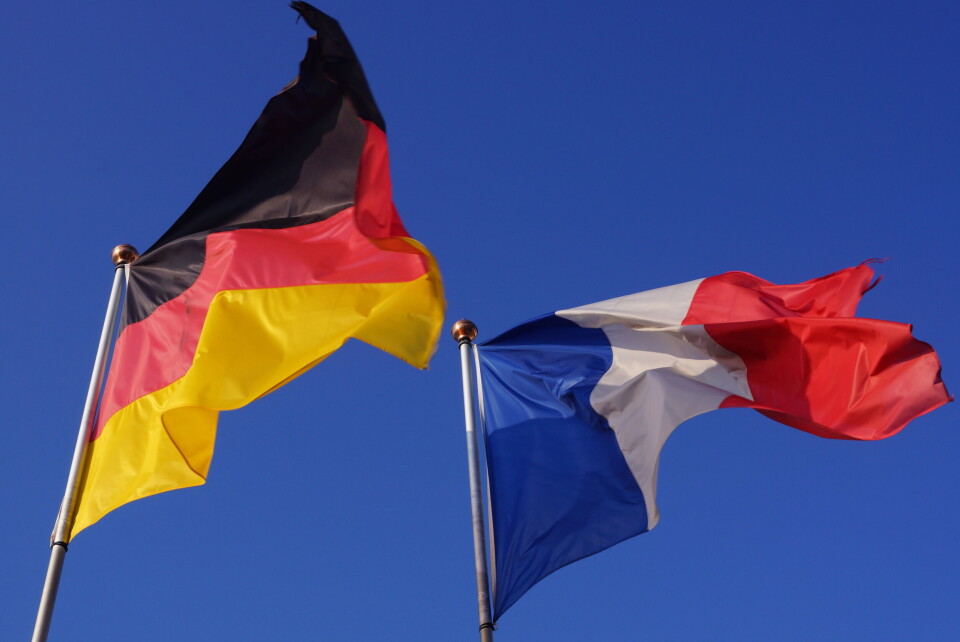-
Comment: Le Tour de France does not export the best of French values
Columnist Nabila Ramdani notes that the fabled race is to start in the UK in 2027, bringing with it a questionable legacy
-
Letters: France needs a new strategy to stop spam calls
Connexion reader says the new legislation will not work just as previous rules failed
-
Letters: VAT threshold reduction would hurt small businesses in France
Connexion reader notes that the additional tax burden would bring more bureaucracy with it
‘France and Germany are like a couple who argue but always make up’
Columnist Richard Ogier looks at how the countries manage to ‘get along’ on the global stage and in everyday life

The big Franco-German meetings — like the 60th anniversary of the Elysée Treaty on January 22 at the Sorbonne — are a little like grand family gatherings, where relations meet up to talk and to bond, to gild the lily a little, to patch things up if need be.
Recent blips and bumps in the Franco-German ‘couple’ culminated in the cancellation of the joint Council of Ministers in the Autumn.
By definition, for the literal proximity they entail, these meetings usually mean making up again.
Read more: 60,000 free train tickets for young to go between France and Germany
‘Surprising’ comments from German Foreign Minister
It would be unwise to overdo the metaphor of the couple given the ups and downs of the relationship.
Yet comments by the German Foreign Minister, Annalena Baerbock, inevitably bring the old tandem to mind.
“You can sometimes yell at your spouse for not putting the cap back on the toothpaste,” she said.
“But the value of a relationship is that you don’t get angry about these things. It’s this trust that I feel every day in the partnership between our two countries”.
Le Monde called the remarks “surprising” but in fact they are gently revealing.
It’s hard to think of a French foreign minister making, to borrow from Tennessee Williams, such right-down homely comments.
Countries want different European direction
Fairly regular Franco-German bonding, or more precisely, re-bonding, makes sense given the enduring differences between the two cultures.
The big picture is one of European like-mindedness, of course, but it’s a different story at the everyday level.
And not merely in politics: holistic Germany vs. Paris-centred France; Germany wanting the EU to expand eastwards, France in favour of a more unitary Franco-German dynamic.
Differences on world stage and day-to-day
Rightly, after Putin’s unconscionable invasion of Ukraine, Germany got a shellacking in the French press for its mercantile energy model, overdependent on Russian gas.
But neither nation can claim moral authority when both were indulgent with the Russian dictator and missed the coming invasion, despite 100,000 Russian troops amassed at the border.
Read more: Macron should look to history to get a better handle on Putin
On the nuts and bolts of daily business — an infinitely lighter subject — cultural trainers, like Sergey Frank, emphasise how punctuality is important for Germans, that lateness can be seen as a sign of unreliability. German managers tend to “speak their mind”.
For the French, a too-direct approach can seem blunt and uncouth.
Negotiations kick off with the big picture, the general principles, arguments are invariably framed in intellectual terms. Food and wine can play an integral part.
‘I married into Franco-German culture’
I’ve always enjoyed this kind of cultural interface. And 15 years ago, I married into it: my wife is Franco-German (French mother, German father), the children are Paris-born.
French is their first language but Munich their favourite city after seven formative years there.
And now we’re living in Strasbourg, the beautiful French city on the German border that locals claim is essential to understanding Europe; that one needs to be a little Germanophile, even Germanophone, to fully appreciate, what with all those complicated place names.
Read more: Did you know? Strasbourg was France’s first Christmas market
So France and Germany sit down as family every day in this apartment, with Australia positioned at the end of the table for the humour.
The grand gestures of the Franco-German relationship are doubtless vital. To quote the Robert Schuman Foundation’s Jean-Dominique Giuliani: “No other pair of states has managed to break with such a dramatic, conflictual past, drawing from it the strength of a privileged alliance.”
But important, too, is le quotidien (der Alltag) — daily life.
Cross-border shopping, dining and dancing
Among 100,000 passengers every year, we often take the Strasbourg Tram D across the Rhine to Kehl in Germany, to shop or eat Italian ice cream, or dine at a simple Spanish restaurant on the main square.
The Rhine used to be a ravine in the psychology of Franco-German relations and is now just a river.
The Franco-German tram, inaugurated only in May, 2017, is now doing some four million trips a year.
So while Paris and Berlin discuss the commanding heights of the bilateral relationship, energy and defence, ‘hegemony’ versus ‘leadership’, ‘sovereignty’ alongside ‘solidarity’, the multitudes are making the easy trip to Germany and back (or vice-versa).
For supermarkets with wide aisles, for discotheques apparently cheaper and open longer than in Strasbourg.
Well, it’s probably such prosaic little stuff — commuting, dining, dancing, developing a shared sense of space — that makes for the basis of lasting, meaningful human relationships. Whatever the glories of the Sorbonne.
Related articles
‘French train travel is a joy compared to Germany’s awful rail system’
French people travel to Italy to buy medicines amid shortages
How far can you get by train in five hours from near you in France?
























